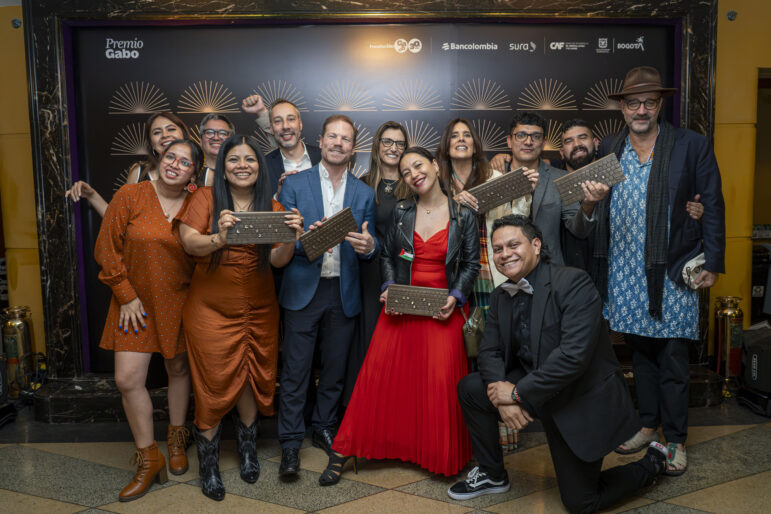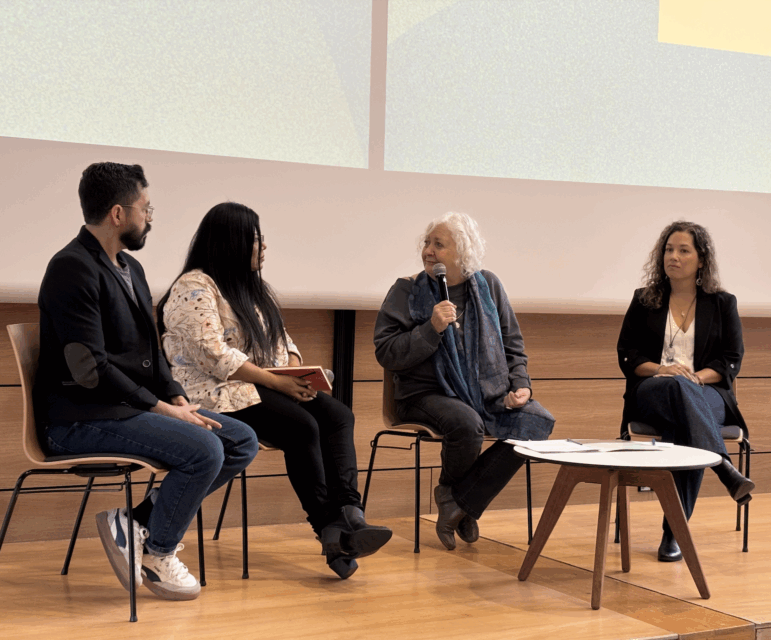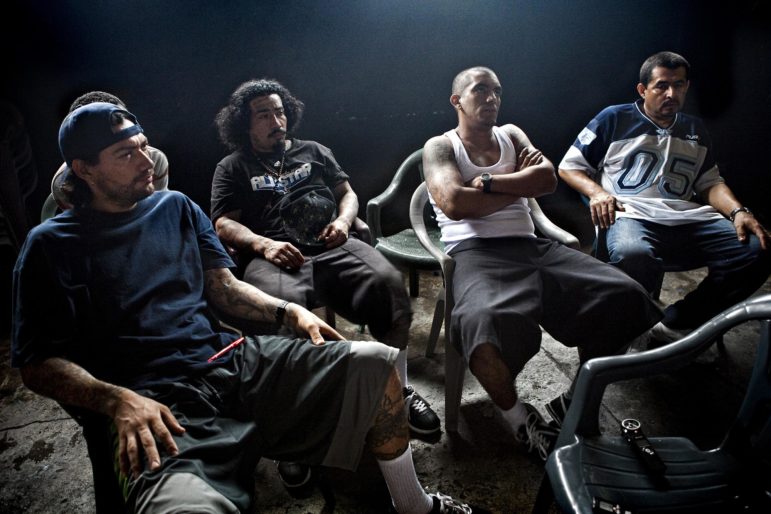

The 13th edition of the Gabo Festival — which celebrates the legacy of Colombian author and Nobel Prize winner Gabriel García Márquez — drew around 15,000 attendees to the Colombian capital, Bogotá. Pictured here are some of the prize-winning reporters. Image: Courtesy of the Gabo Foundation
Festival Gabo 2025: Journalism as a ‘Light of Hope’ in an Increasingly Challenging Era for Latin America
Read this article in
Portraits of the legacy of mining on an Indigenous community in Colombia. A data project that unveils the number of migrants who have perished crossing the Rio Bravo. A journalist driven into exile for uncovering stories of the disappeared and state violence in El Salvador. An investigation revealing apartheid-style policies in the Dominican Republic targeting Haitians and their descendants.
These were just some of the powerful stories featured at the 2025 Gabo Festival, which took place in the Colombian capital Bogotá.
Held from July 24 to 27, this year’s Gabo gathering once again proved to be one of the most important gatherings of journalists from across Latin America. Drawing media professionals from the region, as well as from Spain, Portugal, the Middle East, and beyond, the festival served as a space for deep dialogue, renewed connections, and bold visions for a sustainable and impactful future of journalism.
One of the most poignant moments came during the announcement of the 2025 Gabo Awards for Excellence. Mónica González, the celebrated Chilean journalist and president of the Gabo Foundation’s Governing Council, told the audience: “Journalists are a light of hope to build a world in which everyone has the right to exist and to express themselves.”
Her words resonated even more deeply as the festival highlighted some of the most urgent challenges facing journalism today, particularly in Latin America, including violence, disinformation, democratic backsliding, migration, the climate crisis, and the growing volatility of digital ecosystems.

Chilean journalist Mónica González, second from the right, delivered remarks at the announcement of the 2025 Gabo Awards for Excellence. Photo: Andrea Arzaba
Five Outstanding Stories
The festival celebrated five winning pieces, one for each of the categories: audio, image, photography, coverage, and text. The selected pieces stood out among more than 2,100 entries submitted from all over the region.
The coverage award went to Rio Bravo, the Waters of a Thousand Dead Migrants, a cross-border investigation led by Mexican journalist Miriam Ramírez in collaboration with El Universal, The Washington Post, and Lighthouse Reports. Combining forensic evidence, government records, and personal testimonies, the project revealed how military strategies by Mexico and the United States have transformed the Rio Bravo into a deadly route for migrants.
Humo: Murder and Silence in El Salvador, a podcast produced by professionals from El Salvador and Mexico for Sonoro and Revista Factum, was recognized in the audio category. The series opens with the story of a serial killer but quickly expands into a deeper investigation, revealing state negligence, press suppression, and the erosion of democratic institutions. Backlash from the courageous reporting eventually forced Salvadoran reporter Bryan Avelar into exile.
The winning piece in the text category was Searching for Mikelson: An Apartheid in the Caribbean, written by Juan Martínez d’Aubuisson and published by Redacción Regional and Dromómanos. The story starts with a disturbing video showing police pushing a man off a rooftop, an image that leads to a powerful investigation into systemic racial discrimination against Haitians in the Dominican Republic.
“In the Heat: Stories of a Reggaetón Warrior,” a documentary by Cuban director Fabien Pisani, was the image category winner. The film follows a pioneer of Cuban reggaetón, whose music confronted state censorship during a time of deep social crisis.
Yolüja, by Colombian photojournalist Fernanda Pineda, was given the photography prize. The series explores the psychological, spiritual, and environmental toll of coal extraction on Indigenous lands.
Additionally, the festival paid tribute to three exceptional figures in Latin American journalism, each recognized with the 2025 Gabo Award for Excellence:
- Argentina: Laura Zommer, director of Chequeado, for her pioneering work in fact-checking in the age of disinformation.
- Brazil: Patrícia Campos Mello for her reporting on disinformation, political violence, and human rights.
- Venezuela: Armando.info for their important investigations into corruption and organized crime, continuing even in exile.
 Andrea Arzaba is GIJN’s Spanish editor and director of the Digital Threats project. She holds a master’s degree in Latin American Studies from Georgetown University in Washington D.C. and a BA from the Universidad Iberoamericana in Mexico City. Her work has appeared in Palabra, Proceso Magazine, Animal Politico, and 100 Reporters, among other media outlets.
Andrea Arzaba is GIJN’s Spanish editor and director of the Digital Threats project. She holds a master’s degree in Latin American Studies from Georgetown University in Washington D.C. and a BA from the Universidad Iberoamericana in Mexico City. Her work has appeared in Palabra, Proceso Magazine, Animal Politico, and 100 Reporters, among other media outlets.









